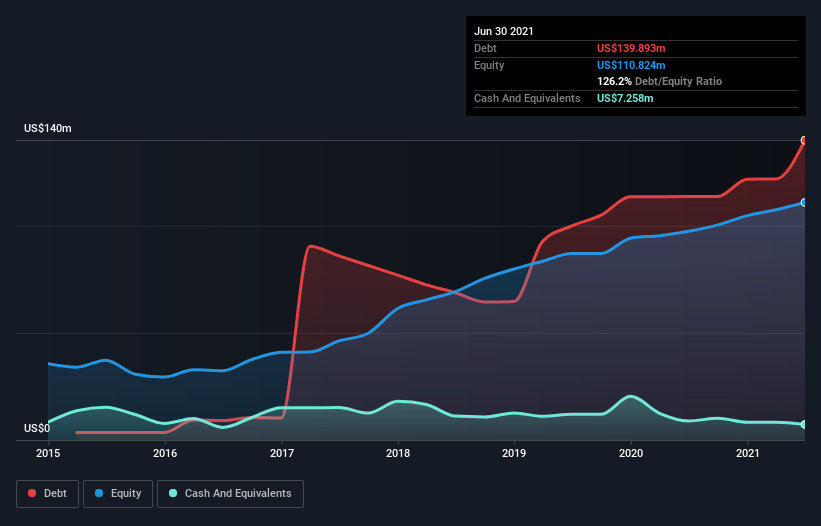Some say volatility, rather than debt, is the best way to think about risk as an investor, but Warren Buffett famously said that 'Volatility is far from synonymous with risk.' When we think about how risky a company is, we always like to look at its use of debt, since debt overload can lead to ruin. As with many other companies Tucows Inc. (NASDAQ:TCX) makes use of debt. But the real question is whether this debt is making the company risky.
When Is Debt Dangerous?
Debt and other liabilities become risky for a business when it cannot easily fulfill those obligations, either with free cash flow or by raising capital at an attractive price. In the worst case scenario, a company can go bankrupt if it cannot pay its creditors. However, a more usual (but still expensive) situation is where a company must dilute shareholders at a cheap share price simply to get debt under control. Of course, plenty of companies use debt to fund growth, without any negative consequences. When we think about a company's use of debt, we first look at cash and debt together.
View our latest analysis for Tucows
How Much Debt Does Tucows Carry?
You can click the graphic below for the historical numbers, but it shows that as of June 2021 Tucows had US$139.9m of debt, an increase on US$113.6m, over one year. However, it also had US$7.26m in cash, and so its net debt is US$132.6m.

A Look At Tucows' Liabilities
Zooming in on the latest balance sheet data, we can see that Tucows had liabilities of US$170.7m due within 12 months and liabilities of US$202.0m due beyond that. Offsetting these obligations, it had cash of US$7.26m as well as receivables valued at US$18.9m due within 12 months. So its liabilities outweigh the sum of its cash and (near-term) receivables by US$346.6m.
This deficit isn't so bad because Tucows is worth US$926.1m, and thus could probably raise enough capital to shore up its balance sheet, if the need arose. But it's clear that we should definitely closely examine whether it can manage its debt without dilution. When analysing debt levels, the balance sheet is the obvious place to start. But it is Tucows's earnings that will influence how the balance sheet holds up in the future. So when considering debt, it's definitely worth looking at the earnings trend. Click here for an interactive snapshot.
In the last year Tucows had a loss before interest and tax, and actually shrunk its revenue by 14%, to US$291m. We would much prefer see growth.
Caveat Emptor
While Tucows's falling revenue is about as heartwarming as a wet blanket, arguably its earnings before interest and tax (EBIT) loss is even less appealing. To be specific the EBIT loss came in at US$3.4m. When we look at that and recall the liabilities on its balance sheet, relative to cash, it seems unwise to us for the company to have any debt. Quite frankly we think the balance sheet is far from match-fit, although it could be improved with time. However, it doesn't help that it burned through US$27m of cash over the last year. So suffice it to say we do consider the stock to be risky. When analysing debt levels, the balance sheet is the obvious place to start. However, not all investment risk resides within the balance sheet - far from it. For example Tucows has 5 warning signs (and 1 which can't be ignored) we think you should know about.
Of course, if you're the type of investor who prefers buying stocks without the burden of debt, then don't hesitate to discover our exclusive list of net cash growth stocks, today.
Valuation is complex, but we're here to simplify it.
Discover if Tucows might be undervalued or overvalued with our detailed analysis, featuring fair value estimates, potential risks, dividends, insider trades, and its financial condition.
Access Free AnalysisThis article by Simply Wall St is general in nature. We provide commentary based on historical data and analyst forecasts only using an unbiased methodology and our articles are not intended to be financial advice. It does not constitute a recommendation to buy or sell any stock, and does not take account of your objectives, or your financial situation. We aim to bring you long-term focused analysis driven by fundamental data. Note that our analysis may not factor in the latest price-sensitive company announcements or qualitative material. Simply Wall St has no position in any stocks mentioned.
Have feedback on this article? Concerned about the content? Get in touch with us directly. Alternatively, email editorial-team (at) simplywallst.com.
About NasdaqCM:TCX
Tucows
Provides domain name registration, email, and other internet related services in North America and Europe.
Low risk and slightly overvalued.
Similar Companies
Market Insights
Weekly Picks


The "Sleeping Giant" Stumbles, Then Wakes Up

Swiped Left by Wall Street: The BMBL Rebound Trade


Duolingo (DUOL): Why A 20% Drop Might Be The Entry Point We've Been Waiting For
Recently Updated Narratives


Hitit Bilgisayar Hizmetleri will achieve a 19.7% revenue boost in the next five years


GameStop will ace the financial crisis wave with its strategic Bitcoin investment and cash reserves


BABA Analysis: Buying the Fear, Holding the Cloud
Popular Narratives


A case for CA$31.80 (undiluted), aka 8,616% upside from CA$0.37 (an 86 bagger!).


NVDA: Expanding AI Demand Will Drive Major Data Center Investments Through 2026





